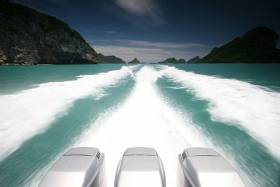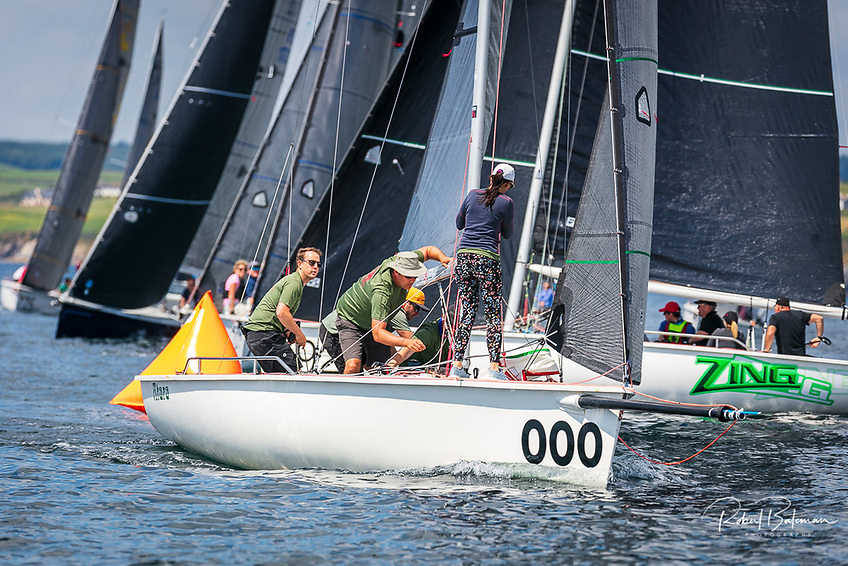Displaying items by tag: Recreational Craft Directive
ICOMIA Brief Boat Builders & Engine Manufacturers on New Recreational Craft Directive
The International Council of Marine Industry Associations (ICOMIA) are advising boat builders and engine manufacturers to check their national trade and distribution channels before interpreting the phrasing within the new Recreational Craft Directive (RCD) relating to engines and components placed on the market that are certified to the old RCD.
The Irish Marine Federation is a member of ICOMIA's International Council.
On 18 January 2017, after a year long transitional period where both old and new Directives have been applicable, the new RCD (2013/53/EU) concerning recreational craft and personal watercraft will become fully applicable meaning marine engines, components and craft certified according to the old RCD (94/25/EC as amended by 2003/44/EC) may no longer be placed on the European market.
After consultation with their members, ICOMIA and IMEC were made aware that boat builders and engine manufacturers were unclear about what the term ‘placed on the market’ exactly meant, and whether watercraft, marine engines and components that were in compliance with the old RCD and ‘placed on the market’ before 18 January would comply with the new RCD after that date.
This issue is addressed within Article 55 of the new RCD, which deals with the transitional period, stating that ‘Member States shall not impede the making available on the market or the putting into service of products covered by Directive 94/25/EC which are in conformity with that Directive and which were placed on the market or put into service before 18 January 2017.’
This means watercraft built to be certified and placed on the market under the new RCD may be fitted with:
• Engines and components certified to the old RCD placed on the market before 18 January 2017
• Engines and components certified according to new RCD • Any combination of the two The European Commission and Market Surveillance Authorities have confirmed the Article 55 guidance is clear.
Nevertheless, ICOMIA is aware that available interpretation may disregard all facets of product import and distribution and that many boat builders are unclear on how to interpret Article 55. “The key message is not to make any assumptions about what ‘placed on the market’ implies” explains Patrick Hemp, ICOMIA Technical Consultant. “Should a manufacturer have any product still in stock that may be deemed not placed on the market, it is important to engage with the EU Member States likely to be involved in trade and customs and clarify the processes as early as possible before 18 January 2017”.
For more help understanding and complying with the RCD, ICOMIA and European Boating Industry have released a revised version of their invaluable ‘Guide to the new RCD’ which is available as an Apple or Android app or pdf file. The Guide covers, in detailed chapters, full information on the new legal framework, the main changes in the essential safety and environmental requirements, the conformity assessment procedures for certification and CE-marking as well as special cases.
Recreational Craft Directive - MIC Register and NBC Register
Marine Notice No. 64 of 2013
This Marine Notice supersedes Marine Notice No. 45 of 2011
Notice to all Manufacturers, Authorised Representatives, Importers, Distributors and Private Importers involved in placing on the market and/or putting into service Recreational Craft and Personal Watercraft
-
This Marine Notice is primarily addressed to Manufacturers, Authorised Representatives, Importers, Distributors and Private Importers involved in placing on the Union market, and/or putting into service, Recreational Craft and Personal Watercraft.
The purpose of this Marine Notice is:
-
to draw attention to the requirements for the marking of recreational craft and personal watercraft in relation to a Manufacturer’s Identification Code (MIC) or Notified Body Code (NBC) and Craft Identification Number (CIN);
-
to request manufacturers of recreational craft and personal watercraft established in Ireland to register their unique MIC with the Irish Maritime Administration of the Department of Transport, Tourism and Sport, Leeson Lane, Dublin 2.
-
Craft Identification Number (CIN):
A Manufacturer’s Identification Code (MIC) makes up part of the Craft Identification Number (CIN).
Every recreational craft and personal watercraft must be permanently marked with a unique Craft Identification Number, known as a CIN. The CIN is assigned by the manufacturer of, or the private importer, of a recreational craft or personal watercraft. The CIN consists of the following information:-
- Country code of the manufacturer;
- The unique Manufacturer’s Identification Code (MIC), or the unique Notified Body Code (NBC) with Post-Construction Assessment (PCA);
- Unique serial number;
- Month and year of manufacture;
- Model year.
The CIN for each craft should be marked in two positions:
-
craft exterior: top of transom, starboard side; and
-
craft interior: in a position that is not visible.
Example of a Craft Identification Number (CIN): “IE-ABC12345D301”
|
IE |
Code of the Country of the manufacturer , e.g. Ireland=IE |
|
ABC/234 i |
The unique Manufacturer’s Identification Code (MIC), or the unique Notified Body Code (NBC) with PCA |
|
12345 ii |
Unique Serial Number (assigned by the manufacturer, or a national authority or recognised organisation) |
|
D |
Month of Manufacture , i.e. A= January, B= February, etc. |
|
3 |
Year of Manufacture (2003) , i.e. Last numeral of the production year. |
|
01 |
Model year (2001) , i.e. twelve-month period during which the craft is intended to be placed for the first time on the market. |
i May consist of numerals and/or letters, except for the numerals 0 and 1.
ii May consist of numerals and/or letters, except for the letters I, O and Q.
-
Manufacturer’s Identification Code (MIC):
After the country code “IE”, the next three characters of the CIN are the Manufacturer’s Identification Code (MIC). Every manufacturer, established in Ireland, of recreational craft and personal watercraft should agree a unique Irish MIC with the Maritime Safety Policy Division ( Irish Maritime Administration) of the Department of Transport, Tourism and Sport, with whom the MICs are registered.
-
An Irish Manufacturer should not use a proposed MIC until the Irish Maritime Administration has acknowledged Registration.
-
Member State MIC Registers of Manufacturers established in EU, EEA and EFTA Member States:
Each Member State should maintain a register of MICs for any manufacturers established in that Member State. Some Member States maintain MIC Registers on-line.
-
Ireland’s MIC Register will shortly be available on-line.
-
European Commission MIC Register of Manufacturers established in Third Countries:
A manufacturer established in a third country or the manufacturer’s authorised representative, who intends for the first time to place recreational craft and/or personal watercraft on the Union market, should request the Member State into which craft are first being imported, to assign a unique MIC to the manufacturer that the Member State registers with the European Commission.
An authorised representative means any natural or legal person established within the Union who has received a written mandate from the manufacturer to act on their behalf in relation to specified tasks.
-
The European Commission maintains the MIC Register for third country manufacturers.
-
European Commission NBC Register of Notified Bodies authorised to carry out Post-Construction Assessments (PCA):
A Notified Body (a body appointed by a Member State to carry out conformity assessment procedures) authorised for conformity module Post-Construction Assessment (PCA) will be assigned a unique Notified Body Code (NBC) by that Member State’s national notifying authority, and the NBC registered with the European Commission.
-
The European Commission maintains the NBC Register for Notified Bodies.
-
Craft Identification Number (CIN) with Post-Construction Conformity Assessment (PCA):
Any recreational craft imported into Ireland from a third country by a private importer must comply with the 1998 and 2004 Recreational Craft Regulations (see paragraph 8 below).
A private importer means any natural or legal person established within the Union who imports, in the course of a non-commercial activity, a recreational craft from a third country into the Union with the intention of putting it into service for his/her own use. In the case of post-construction assessment for the recreational craft, if neither the manufacturer nor their authorised representative established within the Union fulfils the responsibilities for the recreational craft's conformity to the Directive, these can be assumed by the private importer who intends putting into service the recreational craft, under his/her own responsibility.
In such a case, the private importer, who intends putting into service the recreational craft, must lodge an application for a post-construction report with a notified body, and provide the notified body with any available document and technical file referring to the first placing on the market of the recreational craft in the country of origin. The notified body must examine the individual recreational craft, and carry out calculations and other assessments to ensure its equivalent conformity with the relevant requirements of Annex I of the Directive. The Notified Body will draw up a Report of Conformity concerning the assessment carried out, and must inform the private importer of his/her obligations.
The private importer, who has similar responsibilities to those of a manufacturer, may then mark the recreational craft with the CE mark and CIN, and display a builder’s plate marked “Post-Construction Certificate”.
-
Background to the requirement to register a MIC and associated Regulations:
The Recreational Craft Directive 94/25/EC was given effect in Irish law by the European Communities (Recreational Craft) Regulations 1998 [Statutory Instrument No. 40 of 1998]. The Directive was amended in 2003 by Directive 2003/44/EC, which was given effect in Irish law by the European Communities (Recreational Craft) (Amendment) Regulations 2004 [Statutory Instrument No. 422 of 2004].
The 1998 Regulations apply from 16 th June 1998 to recreational craft, partly completed boats and components. The 2004 Regulations apply from 1 st January 2005, and they extend the law to include personal watercraft and to provide harmonised provisions for exhaust emissions and noise emissions.
The Regulations lay down requirements for the design and construction of recreational craft and partly completed recreational craft, personal watercraft, components, propulsion engines, including those subject to major engine modifications, and recreational craft, including those subject to major craft conversion. These products must meet the essential safety, health, environmental protection and consumer protection requirements.
Manufacturers, authorised representatives, importers, distributors and private importers may not place on the market, or put into service any of the above products that do not comply with the Regulations.
Within the Department of Transport, Tourism and Sport, the Irish Maritime Administration is the Regulatory Authority charged with implementation, market surveillance, and enforcement of the Regulations.
Marine Notice No. 45 of 2011 is hereby withdrawn.
Irish Maritime Administration,
Department of Transport, Tourism and Sport,
Leeson Lane, Dublin 2, Ireland.
19/11/2013
Marine Notice on Exemptions from EU Regulations for Recreational Water Craft
#NEWS UPDATE - A recent Marine Notice from the Department of Transport, Tourism and Sport (DTTAS) advises consumers, retailers and manufacturers on the types of craft to which the EU recreation water craft regulations do not apply.
In general recreational craft and related products must meet the essential safety, health, environmental protection and consumer protection requirements of the Recreational Craft Directive as set out in the Recreational Craft Regulations.
However, these regulations do not apply to craft intended solely for racing; canoes and kayaks; gondolas and pedalos; surfboards; historical water craft and replicas; experimental craft and ones built for own use; commercial craft; and a number of others.
These exceptions are however still subject to the EU's General Product Safety Directive.
Complete details are included in Marine Notice No 56 of 2011, a PDF of which is available to read and download HERE.
- Marine Notice
- water craft
- regulations
- EU
- Department of Transport, Tourism and Sport
- DTTAS
- consumers
- retailers
- manufacturers
- recreational craft
- Safety
- Health
- environmental protection
- Recreational Craft Directive
- Recreational Craft Regulations
- racing
- Canoes
- Kayaks
- gondolas
- pedalos
- surfboards
- historical
- replica






























































